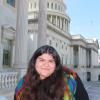I move out of my homestay in four days. Amid the madness of studying for finals, submitting my last written assignments, and preparing to travel Italy for two weeks, I’m glad to have found some time to reflect. My jumbled collection of recent memories still needs a great deal of processing but at this point a few overarching themes of my semester are clear. One is the stark difference between the political cultures in Madrid and at my home university.
Occidental, like many small liberal arts colleges, has a strong progressive political culture. During my first year I had the opportunity to take two incredible classes, one on gentrification in Los Angeles (specifically in Highland Park, a neighborhood adjacent to Occidental) and another on the prison industrial complex. During my second year I, like most of my friends, participated in the occupation of an administrative building to protest the college administration’s neglect of students of color and mishandling of sexual assault cases. Last semester the school was in the press nationwide because a group of students uprooted and threw away hundreds of American flags that were planted around the quad on 9/11. Part of the school’s progressive culture is a near unanimous stance on catcalling, a demeaning act which is thankfully relatively rare.
When I say relatively I mean relative to Madrid. On Friday night I was skating with my friend Nico and two of his friends. One, Maxime, is from Monaco, and the other, Dani, is Spanish. We were skating on a busy walkway and whenever a young woman walked by Dani would giggle and tap Maxime’s shoulder, signaling for Maxime to call out something like, “Hola, ¿quieres conocerme?” which inevitably sent Dani into a fit of laughter. I think they could tell I disapproved because at one point Dani looked at me and asked, “Pero tío, ¿para qué ser políticamente correcto?”
It wasn’t the first time I had heard the sentiment. On one of my first days in Madrid a professor told our class he hated “political correctness.” I asked him what he meant after class and he told me that for him, political correctness was refraining from saying certain things out of fear of being called out. During the next class he said that when he saw Beyonce all he saw was “un culo enorme,” that her body was nice but her music was worthless. In another class a professor got defensive when a student took issue with an audio exercise that described a surprise party where everyone was dressed up as Japanese people. She said that Spanish people saw it differently, that it wasn’t racist, just exotic. She continued, saying that in Spain the culture of political correctness didn’t exist but that people were genuinely less bigoted than they were in the U.S.
People here don’t associate progressive values with a culture of policing offensive speech to the same degree that they do back home. Even the progressive Spanish people I’ve met aren’t in favor of censoring their own or other people’s speech. But the absence of a “politically correct” vocabulary doesn’t always lead to more prohibitive social norms. I have, in fact, seen free expression here that would surprise me at home. I see gay couples making out on the street all the time and no one bats an eye. Most surprising to me, I saw two boys who looked to be about 14 holding hands on the subway. I had never seen a gay couple that young displaying affection publicly in the states. It was cool.
I don’t want to draw too many hasty conclusions from these limited observations. I’ve only been here a few months. I can say for sure, though, that when my friend was walking to a bar the other night a man on the street said he could pay her in cash. The machismo in Spain is strong, and what’s more I haven’t talked to any Spanish men who are willing to recognize that it’s a problem. Many Spanish people I’ve talked to take great pride in the fact that Spain doesn’t have any explicitly racist political party (unlike France and the Netherlands, among other countries), but resist the idea that casual racism can be harmful too. That being said, it seems that gay and lesbian couples feel freer to display their love publicly in Madrid than they do in any American city that I’ve been in. While the level of “sensitivity,” in the sense I’m familiar with, seems lacking, the culture is frank and open and encourages a certain degree of free expression.
Spending a semester with people who don’t share my political convictions has at times been uncomfortable, but in some ways I feel I’ve benefited. Talking about racism and machismo in Spain has forced me to verbalize my own values more often, and to figure out why I believe what I do. It has also given me a better idea of what people in different parts of the world think racism is. Overall, I think it has broadened my understanding of how oppressive social constructions function and how people view them. I guess that’s just a part of understanding cultural differences.

Max Harrison-Caldwell
I’m a Spanish major in my third year at Occidental College. I want to pursue a career in journalism after graduating so right now I’m trying to get as much writing experience as I can. In addition to writing, I like skateboarding and pita chips.







